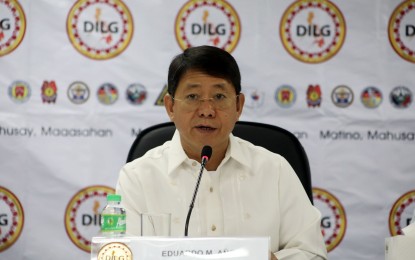
DILG Secretary Eduardo Año. (File photo)
MANILA - The Department of the Interior and Local Government (DILG) denounced the report of International Criminal Court (ICC) Fatou Bensouda claiming that crimes against humanity have been committed under the government's anti-illegal drug campaign for being false, biased, and without factual and legal basis.
"As the Report itself admits, Ms. Bensouda is still conducting a preliminary investigation, and no criminal investigation or proceeding has been conducted in the ICC proper. Moreover, the Report itself stressed that Ms. Bensouda’s office "anticipates deciding on whether to seek authorization to open an investigation into the situation in the Philippines in the first half of 2021,” therefore, opposition claims that Bensouda has already found “crimes against humanity” in the Philippines are not only misleading but are outright false and ridiculous," DILG Secretary Eduardo Año said in a news release.
Año said instead of wasting valuable time and resources on a biased and worthless exercise, the prosecutor should instead focus on bringing justice to the victims of the gravest crimes of concern to the international community that continue to be rampant in other countries for many years now.
He said the Philippines’ judicial system is fully functioning and that any alleged abuses in the drug war can and should be independently tried, heard, and decided by the Philippine courts.
"I wish to emphasize the upholding of the presumption of regularity in the performance of duty of the police. As the Philippine Supreme Court has held many times, to successfully overcome such presumption of regularity, case law demands that the evidence against it must be clear and convincing; absent the requisite quantum of proof to the contrary, the presumption stands deserving of faith and credit. The burden of proof to overcome such presumption rests on Ms. Bensouda," he said. "Assuming that Bensouda has actually commenced formal proceedings against the Philippines (which it has not), the same cannot legally proceed because the Philippines is not within its jurisdiction, by virtue of our withdrawal from the ICC on March 2020. Article 127 of the Rome Statute is clear that the ICC cannot invoke even an ounce of its jurisdiction over the Philippines by the very absence of any criminal investigation or proceeding commenced against it."
Citing the very principles of due process and equity, Año said no stretch of legal interpretation can enable the ICC to harp on its exercise of jurisdiction over the Philippines.
"The DILG, as the guardian of public order, safety, and good governance denounces human rights violations in any form. The DILG has been espousing good governance through policies and incentive programs to the local government sector. In the same vein, the DILG together with the National Police Commission (Napolcom) and Philippine National Police (PNP), has instituted an intensive internal cleansing program to cleanse the ranks of police officers," he said.
In fulfillment of its commitment to the goal of a drug-free Philippines by 2022, the DILG established the Philippine Anti-Illegal Drug Strategy - Project Management Office (PADS-PMO) to lead anti-illegal drug initiatives, continually develop policies, programs, and activities even during this pandemic.
He added that the DILG collaborates with partner agencies such as the Dangerous Drugs Board (DDB), the Philippine Drug Enforcement Agency (PDEA), and the Department of Health (DOH) for the realignment of the anti-drug plans and programs amid the pandemic always concerning the human rights of all individuals.
The DILG also recently conducted the 2020 Anti-illegal Drugs Abuse Council (ADAC) Special Awards to recognize the merits of LGUs and civil society organizations (CSOs) on anti-illegal drugs. Special Awards are given to LGUs that sustained the drug-cleared status of their affected barangays and drug-free status of their unaffected barangays. All these initiatives are communicated and coordinated with national government agencies and are reported in unison to concerned international bodies. The anti-drug campaign is indeed holistic, addressing both the supply and demand aspect of the drug menace.
"While we are firm in our drive to curb the problem of illegal drugs, we denounce any form of human rights violation. The DILG is working closely with the PNP in ensuring that no atrocities are committed by our police officers in the performance of their sworn duties and that the rights of every Filipinos enshrined in the 1987 Philippine Constitution is protected," he added.
Año said it is disheartening to the front-liners in the fight against illegal drugs that the gains in peace and order are not highlighted and instead besmirched with baseless charges which only serves to embolden drug syndicates who portray themselves as victims when, in fact, they are the menace to the Filipino people, especially to the youth.
"The DILG fully commits to the whole-of-society approach in eradicating the country’s illegal drug problem to achieve the vision of drug-free communities without sacrificing the rule of law and the protection of human rights," he said. (PR)
